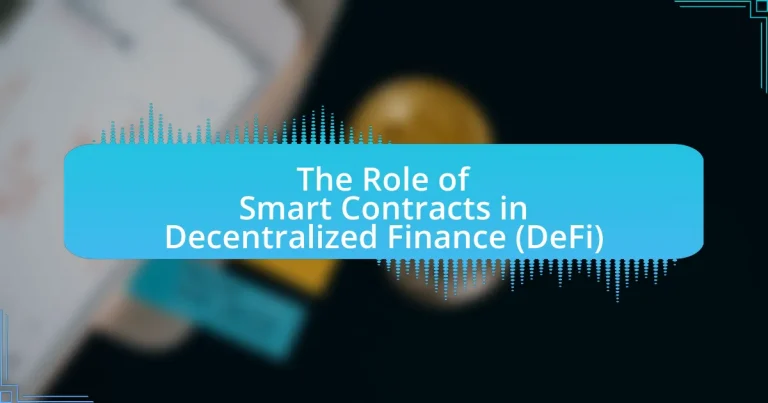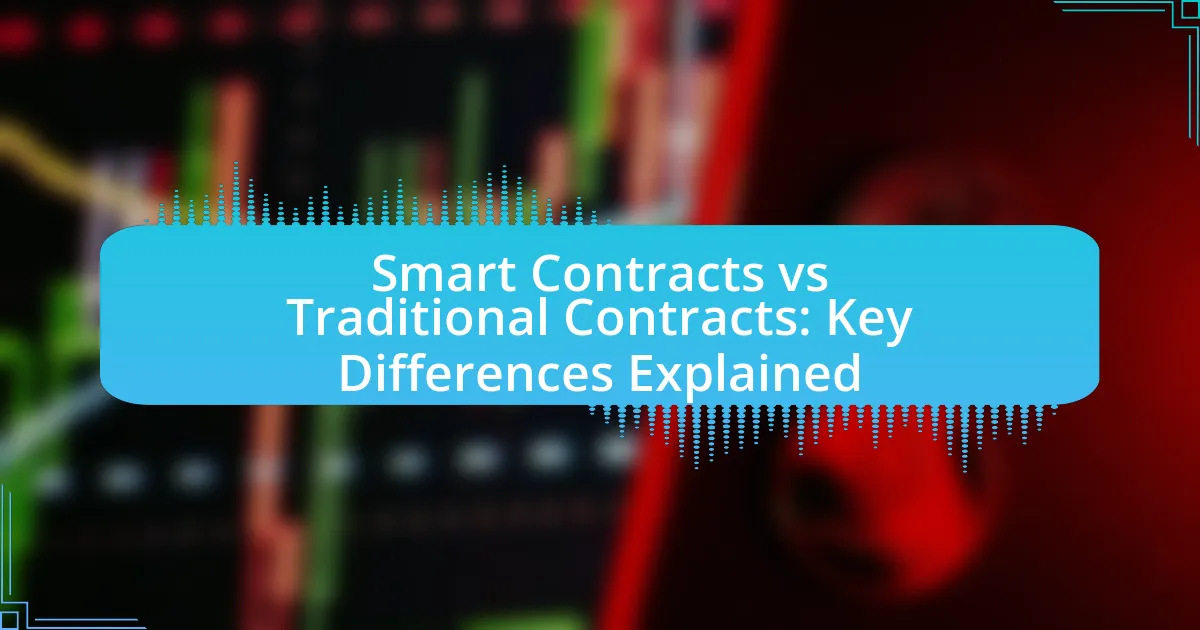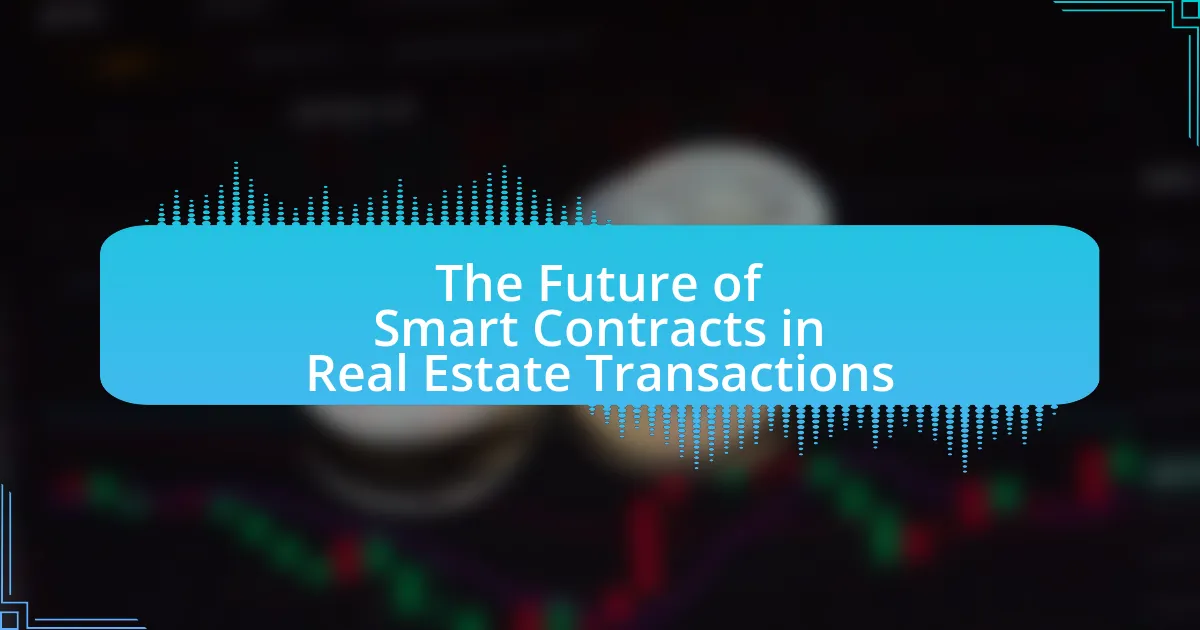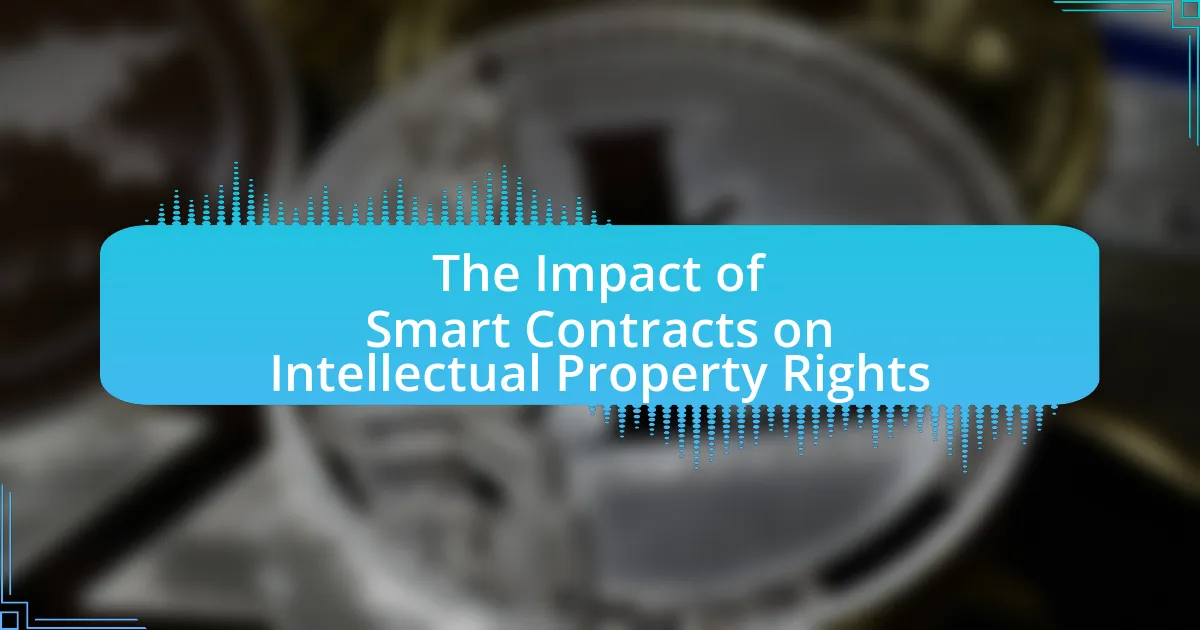Smart contracts are self-executing agreements coded on a blockchain, playing a pivotal role in decentralized finance (DeFi) by automating and enforcing financial transactions without intermediaries. This article explores the functionality of smart contracts within DeFi ecosystems, detailing their advantages such as increased efficiency, transparency, and security. It also examines the programming languages used for their development, the key components that define them, and the various DeFi applications they facilitate, including decentralized exchanges and lending platforms. Additionally, the article addresses the challenges and limitations faced by smart contracts, including security vulnerabilities and regulatory uncertainties, while highlighting best practices for developers to enhance reliability and compliance.
--Smart-contracts-in-the-cont-1.webp)
What are Smart Contracts in the Context of Decentralized Finance (DeFi)?
Smart contracts in the context of decentralized finance (DeFi) are self-executing contracts with the terms of the agreement directly written into code on a blockchain. These contracts automate and enforce financial transactions without the need for intermediaries, thereby increasing efficiency and reducing costs. For instance, Ethereum, a leading blockchain platform for DeFi, enables developers to create smart contracts that facilitate lending, borrowing, and trading of assets in a trustless environment. The use of smart contracts in DeFi has led to a significant increase in the total value locked in DeFi protocols, which surpassed $100 billion in 2021, demonstrating their critical role in transforming traditional financial systems.
How do Smart Contracts function within DeFi ecosystems?
Smart contracts function as self-executing agreements with the terms directly written into code within DeFi ecosystems. They automate processes such as lending, borrowing, and trading by executing transactions when predefined conditions are met, eliminating the need for intermediaries. For instance, in a decentralized lending platform, a smart contract can automatically transfer collateral and funds between parties based on the agreed terms, ensuring transparency and security. This functionality is supported by blockchain technology, which provides an immutable and transparent ledger, reinforcing trust among users.
What programming languages are commonly used to create Smart Contracts?
The programming languages commonly used to create Smart Contracts are Solidity, Vyper, and Rust. Solidity is the most widely used language for Ethereum-based Smart Contracts, designed specifically for the Ethereum Virtual Machine (EVM). Vyper is another language for Ethereum that emphasizes security and simplicity, making it suitable for Smart Contracts that require a high level of trust. Rust is utilized in blockchain platforms like Polkadot and Solana, known for its performance and safety features. These languages are integral to the development of Smart Contracts in decentralized finance (DeFi) applications, enabling automated and trustless transactions.
What are the key components of a Smart Contract in DeFi?
The key components of a Smart Contract in DeFi include code, execution environment, and data storage. The code defines the rules and logic of the contract, enabling automated transactions without intermediaries. The execution environment, typically a blockchain like Ethereum, ensures that the contract operates in a decentralized and secure manner. Data storage holds the state and history of transactions, allowing for transparency and verifiability. These components work together to facilitate trustless interactions in decentralized finance, as evidenced by the widespread use of smart contracts in protocols like Uniswap and Aave, which rely on these elements for their operations.
What advantages do Smart Contracts provide in DeFi?
Smart contracts provide automation, transparency, and security in decentralized finance (DeFi). They enable self-executing agreements without intermediaries, reducing transaction costs and time. For instance, Ethereum’s smart contracts facilitate automated lending and borrowing processes, allowing users to engage in financial transactions directly on the blockchain. This eliminates the need for traditional financial institutions, thereby enhancing efficiency and accessibility. Additionally, the immutable nature of smart contracts ensures that once deployed, the terms cannot be altered, which increases trust among users. According to a report by the World Economic Forum, smart contracts could potentially save the financial services industry up to $400 billion annually by streamlining operations and reducing fraud.
How do Smart Contracts enhance security in financial transactions?
Smart contracts enhance security in financial transactions by automating and enforcing agreements through code, which reduces the risk of human error and fraud. These self-executing contracts operate on blockchain technology, ensuring that all transaction data is immutable and transparent. For instance, once a smart contract is deployed, it cannot be altered, which prevents tampering and ensures that all parties adhere to the agreed terms. Additionally, the use of cryptographic techniques in smart contracts protects sensitive information and verifies identities, further securing the transaction process. This combination of automation, immutability, and cryptographic security significantly mitigates risks associated with traditional financial transactions.
What role do Smart Contracts play in automating processes in DeFi?
Smart contracts are essential in automating processes in decentralized finance (DeFi) by executing predefined conditions without the need for intermediaries. They facilitate transactions, lending, borrowing, and trading by automatically enforcing agreements coded within the blockchain. For instance, in a lending protocol, smart contracts can autonomously manage collateral, interest rates, and repayments, ensuring that all parties adhere to the terms without manual intervention. This automation reduces operational costs and enhances efficiency, as evidenced by platforms like Aave and Compound, which utilize smart contracts to streamline their lending processes.

How do Smart Contracts facilitate various DeFi applications?
Smart contracts facilitate various DeFi applications by automating and enforcing agreements without intermediaries. They execute predefined conditions coded into the blockchain, ensuring trust and transparency in transactions. For instance, in lending platforms, smart contracts automatically manage collateral and interest rates, reducing the risk of default and enhancing efficiency. Additionally, decentralized exchanges utilize smart contracts to enable peer-to-peer trading, eliminating the need for centralized control. The use of smart contracts in DeFi has led to increased liquidity and accessibility, as evidenced by the rapid growth of DeFi protocols, which collectively locked over $80 billion in assets by mid-2021, demonstrating their significant impact on the financial ecosystem.
What types of DeFi applications utilize Smart Contracts?
Decentralized Finance (DeFi) applications that utilize smart contracts include decentralized exchanges (DEXs), lending platforms, yield farming protocols, and stablecoins. DEXs like Uniswap and SushiSwap use smart contracts to facilitate peer-to-peer trading without intermediaries. Lending platforms such as Aave and Compound leverage smart contracts to automate the borrowing and lending process, ensuring trustless transactions. Yield farming protocols, including Yearn Finance, utilize smart contracts to optimize returns on cryptocurrency holdings. Stablecoins like DAI are governed by smart contracts to maintain price stability through collateralization mechanisms. These applications demonstrate the versatility and efficiency of smart contracts in automating financial services within the DeFi ecosystem.
How do Smart Contracts enable decentralized exchanges (DEXs)?
Smart contracts enable decentralized exchanges (DEXs) by automating and enforcing the terms of trades without the need for intermediaries. They facilitate peer-to-peer transactions by executing trades based on predefined conditions coded into the contract, ensuring transparency and security. For instance, on platforms like Uniswap, smart contracts manage liquidity pools and execute trades directly on the blockchain, eliminating the risks associated with centralized exchanges, such as hacking or fraud. This functionality is supported by the Ethereum blockchain, which allows for programmable contracts that can handle complex trading scenarios, thereby enhancing the efficiency and reliability of DEXs.
What is the role of Smart Contracts in lending and borrowing platforms?
Smart contracts automate and enforce the terms of lending and borrowing agreements on decentralized finance (DeFi) platforms. They eliminate the need for intermediaries by executing transactions based on predefined conditions, ensuring trust and transparency between parties. For instance, when a borrower requests a loan, the smart contract verifies collateral and automatically disburses funds if conditions are met, while also managing repayment schedules and interest calculations. This process reduces operational costs and enhances efficiency, as evidenced by platforms like Aave and Compound, which utilize smart contracts to facilitate billions in transactions without traditional banking infrastructure.
How do Smart Contracts contribute to liquidity pools and yield farming?
Smart contracts facilitate liquidity pools and yield farming by automating transactions and enforcing rules without intermediaries. They enable users to deposit assets into liquidity pools, which are then used for trading on decentralized exchanges, ensuring that trades can occur seamlessly. Additionally, smart contracts manage the distribution of rewards to liquidity providers based on their contributions, incentivizing participation in yield farming. This automation reduces the need for trust and manual intervention, enhancing efficiency and security in decentralized finance operations.
What mechanisms do Smart Contracts use to manage liquidity?
Smart contracts manage liquidity primarily through automated market-making (AMM) protocols, which facilitate the trading of assets without the need for traditional order books. These protocols utilize liquidity pools, where users deposit assets to provide liquidity in exchange for transaction fees and rewards. For example, Uniswap, a leading AMM, allows users to swap tokens directly from these pools, ensuring that liquidity is always available for trades. Additionally, smart contracts can implement dynamic pricing algorithms that adjust based on supply and demand, further optimizing liquidity management. This mechanism is validated by the significant volume of trades executed on decentralized exchanges, demonstrating the effectiveness of smart contracts in maintaining liquidity in the DeFi ecosystem.
How do Smart Contracts automate yield distribution in farming?
Smart contracts automate yield distribution in farming by executing predefined rules and conditions on blockchain networks without the need for intermediaries. These self-executing contracts automatically allocate rewards to participants based on their contributions, such as the amount of cryptocurrency staked or the duration of their investment. For instance, in decentralized finance (DeFi) platforms, smart contracts can calculate and distribute yield based on real-time data, ensuring that users receive their earnings promptly and accurately. This automation reduces the risk of human error and enhances transparency, as all transactions are recorded on the blockchain, allowing for verifiable and tamper-proof yield distribution.

What challenges and limitations do Smart Contracts face in DeFi?
Smart contracts in DeFi face several challenges and limitations, including security vulnerabilities, scalability issues, and regulatory uncertainty. Security vulnerabilities arise from coding errors and exploits, as evidenced by incidents like the DAO hack in 2016, which resulted in a loss of $60 million. Scalability issues are prevalent due to network congestion, particularly on Ethereum, where transaction speeds and costs can hinder performance during peak usage. Regulatory uncertainty complicates the legal status of smart contracts, as jurisdictions vary in their approach to blockchain technology, potentially impacting their adoption and functionality. These factors collectively pose significant obstacles to the effective implementation of smart contracts in decentralized finance.
What are the common vulnerabilities associated with Smart Contracts?
Common vulnerabilities associated with smart contracts include reentrancy attacks, integer overflow and underflow, gas limit and loops, timestamp dependence, and improper access control. Reentrancy attacks occur when a contract calls another contract and allows the second contract to call back into the first contract before the first execution is complete, potentially leading to unexpected behavior. Integer overflow and underflow happen when arithmetic operations exceed the maximum or minimum value that can be stored, causing unintended consequences. Gas limit and loops can lead to failures in execution if a contract requires more gas than is available, while timestamp dependence can be exploited if a contract relies on block timestamps for critical functions. Lastly, improper access control can allow unauthorized users to execute functions that should be restricted, leading to security breaches. These vulnerabilities have been documented in various incidents, such as the DAO hack in 2016, which exploited reentrancy, resulting in a loss of $60 million worth of Ether.
How can coding errors impact the functionality of Smart Contracts?
Coding errors can severely impact the functionality of smart contracts by causing unintended behaviors or vulnerabilities. These errors can lead to financial losses, as seen in incidents like the DAO hack in 2016, where a coding flaw allowed an attacker to drain $60 million worth of Ether. Additionally, coding errors can result in the failure of contract execution, preventing transactions from being processed correctly, which undermines trust in decentralized finance systems. The immutability of smart contracts means that once deployed, these errors are difficult to rectify, further exacerbating their impact on functionality and security.
What measures can be taken to mitigate risks in Smart Contracts?
To mitigate risks in Smart Contracts, implementing thorough code audits and testing is essential. Code audits by experienced professionals can identify vulnerabilities and ensure compliance with best practices, reducing the likelihood of exploits. Additionally, employing formal verification methods can mathematically prove the correctness of the contract’s logic, further enhancing security. Utilizing established frameworks and libraries, such as OpenZeppelin, can also minimize risks by providing well-tested components. Furthermore, incorporating multi-signature wallets and time locks can add layers of security, ensuring that transactions require multiple approvals and cannot be executed hastily. These measures collectively contribute to a more secure Smart Contract environment in Decentralized Finance (DeFi).
How does regulatory uncertainty affect Smart Contracts in DeFi?
Regulatory uncertainty significantly impacts smart contracts in DeFi by creating risks that can deter investment and innovation. When regulations are unclear or inconsistent, developers may hesitate to deploy smart contracts due to fears of legal repercussions or compliance challenges. For instance, the lack of clear guidelines on how existing financial regulations apply to decentralized applications can lead to a chilling effect, where potential users and investors avoid engaging with DeFi projects. This hesitance can stifle the growth of the DeFi ecosystem, as evidenced by the decline in new project launches during periods of heightened regulatory scrutiny, such as the increased focus on cryptocurrency regulations by the U.S. Securities and Exchange Commission in 2021.
What are the implications of compliance for Smart Contracts?
Compliance for Smart Contracts involves adhering to legal and regulatory standards, which is crucial for their acceptance and functionality in decentralized finance (DeFi). Non-compliance can lead to legal repercussions, loss of trust, and potential invalidation of contracts. For instance, jurisdictions may require Know Your Customer (KYC) and Anti-Money Laundering (AML) measures to be integrated into smart contracts to ensure they meet regulatory requirements. Failure to implement these measures can result in penalties or restrictions on the use of the smart contracts, thereby affecting the overall ecosystem of DeFi.
How can Smart Contracts adapt to changing regulatory environments?
Smart contracts can adapt to changing regulatory environments by incorporating flexible governance mechanisms and updatable code. These features allow developers to modify contract terms in response to new regulations, ensuring compliance while maintaining functionality. For instance, Ethereum’s ERC-20 token standard allows for the implementation of upgradeable contracts through proxy patterns, enabling developers to adjust contract logic without losing existing data. This adaptability is crucial in the rapidly evolving landscape of decentralized finance, where regulatory frameworks are still being established.
What best practices should developers follow when creating Smart Contracts?
Developers should follow best practices such as thorough testing, code audits, and adherence to established standards when creating Smart Contracts. Thorough testing ensures that the contract behaves as expected under various conditions, reducing the risk of bugs that could lead to financial loss. Code audits by independent third parties help identify vulnerabilities and improve security, as evidenced by the increased number of audits conducted in the industry, which have been shown to significantly reduce the likelihood of exploits. Adhering to established standards, such as ERC-20 for tokens, promotes interoperability and reduces complexity, making it easier for developers to create reliable and secure contracts.
How can thorough testing improve Smart Contract reliability?
Thorough testing improves Smart Contract reliability by identifying vulnerabilities and ensuring correct functionality before deployment. This process involves various testing methodologies, such as unit testing, integration testing, and formal verification, which collectively help detect logical errors, security flaws, and performance issues. For instance, the DAO hack in 2016, which resulted in a loss of $60 million, highlighted the critical need for rigorous testing, as the exploit stemmed from a flaw in the smart contract code that could have been caught through comprehensive testing. By implementing thorough testing protocols, developers can significantly reduce the risk of failures and enhance the overall trustworthiness of Smart Contracts in decentralized finance applications.
What tools are available for auditing Smart Contracts?
Tools available for auditing Smart Contracts include MythX, Slither, and Oyente. MythX is a comprehensive security analysis platform that provides static and dynamic analysis for Ethereum smart contracts, helping to identify vulnerabilities. Slither is a static analysis tool that offers a suite of analyses to detect common security issues in Solidity code. Oyente is another static analysis tool that focuses on detecting security vulnerabilities in Ethereum smart contracts by simulating their execution. These tools are widely recognized in the blockchain community for their effectiveness in enhancing the security and reliability of smart contracts in decentralized finance applications.
It is not possible to provide an answer to the question “
” as it does not contain a specific inquiry or context to address.















